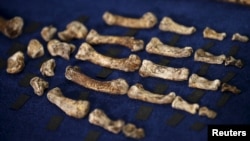The fossilized bones of 15 members of an ancient species related to humans have been discovered in a cave in South Africa, scientists said Thursday, hailing the find as a breakthrough in evolution research.
The hominid - described as a "new species" of human - has been named Homo naledi after the "Rising Star" cave where the bones were found. Naledi means "star" in Sesotho, a local South African language.
The find was announced Thursday by an international team of scientists led by Lee Berger, an American paleoanthropologist at the University of the Witwatersrand in Johannesburg.
"I've been working in paleoanthropology for 25 years, and this is the most significant discovery in that time," said John Hawks of the University of Wisconsin-Madison, a senior author on the academic paper detailing the new species
"We do not have other fossil samples that represent any kind of early hominim with this kind of enormous sample. We have 80 [year-olds] to young adults, we have the biology of development represented in this sample because you can look at the changes with age," he said.
The researchers who published their findings in the journal eLIFE, said Homo naledi likely walked upright, stood about 1.5 meters tall and weighed 45 kilograms. They also described the hands and feet as human-like, but said the ribcage, shoulders and pelvis were closer to other early ancestors than to those of modern humans.
"Homo naledi had a tiny brain, about the size of an average orange, perched atop a very slender body," said Hawks. "We know more about its biology than we do about almost any other fossil human relative. It is unprecedented."
About 1,500 fossils were found deep in a hard-to-reach section of a cave system known as the Cradle of Humankind World Heritage Site outside Johannesburg. The bones were hidden in a chamber only accessible via several steep climbs and narrow rock crevasses.
The discovery is the largest sample excavated from any human ancestor site in Africa, and one of the largest in the world, researchers said, adding that it is likely just a small fraction of the fossils yet to be recovered from the chamber.
They believe Homo naledi emerged between 2.5 million and 2.8 million years ago, but the bones found at the site might be younger than that. The team said dating the bones is one of their next challenges.
Also unclear is why the bones were in the remote part of the cave in the first place. Scientists speculated others could have placed bodies there in a type of behavior rarely found in early humans.
The first expedition to the cave chamber in 2013 lasted 21 days and involved more than 60 specialist cavers and scientists working in dangerous conditions, squeezing through tiny gaps in the rock.
Since then scientists have been studying the bones, which are from infants, children, adults and elderly individuals, before revealing their conclusions.
"This chamber has not given up all of its secrets," Berger, an American from Kansas, added. "There are potentially hundreds if not thousands of remains of Homo naledi still down there."











